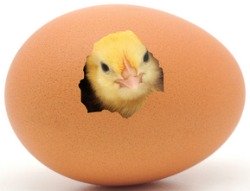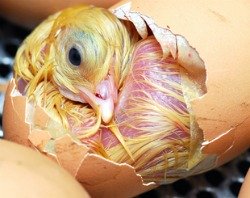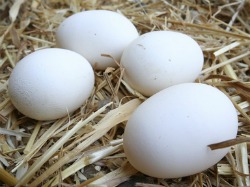Hatching Chicken Eggs
When hatching chicken eggs, there are many things to consider: Taking time to choose the right eggs, the correct egg incubator, and being careful to maintain the correct settings, humidity and temperatures all play an important role in whether or not incubating eggs will be a success.
Choosing the Right Eggs
Choosing the right eggs may include your own chickens, or purchasing hatching eggs. Local breeders may offer hatching eggs or you can purchase them online.
If choosing from your own chickens, you may want to be selective, only incubating eggs from your best chickens. Choose the healthiest chickens and the ones that display the physical appearance you want to keep.
You may want to avoid things like crooked toes, wry tail and other physical defects. If you have a particularly human aggressive rooster, you may not want to pass on that tendency.
Before deciding which chicken eggs to hatch, know that young chickens will have a high fertility rate, but older hens and roosters with good type should be considered to pass on their good genetics.

Breeding within family members is often done, though it’s better not to breed a rooster to his mother and sisters. Breeding a rooster to his daughters is more genetically sound, though too many generations of this will cause in-breeding, which can multiply more undesirable qualities.
Bringing in a new and unrelated rooster every few years will add vigor to the blood lines you are working with and refresh the good qualities you want, no matter what hens you have kept for breeding.
It is important to remember that a hen's natural fertility is hardly ever 100 percent, so expecting all chicken eggs to hatch, even under the best conditions, is not realistic. Embryos that fail to mature may have genetic disorders or there could have been incubation problems, even if all eggs are fertile.
After the first week of incubation you can candle the eggs and discard any without developing embryos. Infertile eggs left in an incubator for 21 days can rot and cause unhealthy air for hatching chicks.
Most of the time, an egg's fertility is 55 to 95 percent based on a number of factors:
- the condition and age of the hen and rooster
- The rooster to hen ratio (best is 1 rooster for every 12 hens)
- the season, diet and environment
- the breed of chicken

The safest bet is to expect anywhere from half, to three quarters of the eggs to hatch. Once the right chickens have been selected, take a close look at the eggs.
Choose chicken eggs that are average in size for each hen:
- Do not choose any that are considerably larger or smaller than those typically produced by the hen, or any that are odd shaped. If you have a hen known for double yolks don’t use her eggs as they rarely hatch.
- Examine the eggs for holes and cracks which may allow the egg to rot or dehydrate in the incubator.

- Do not wash the egg shells, as this could remove the natural coating and organisms present to protect the egg through the incubation process.
Before incubating chicken eggs, take steps to ensure they are properly cared for as this will give you a more productive hatch.
Setting all eggs into the incubator at once will give you a good clutch of chicks the same age and easier to manage. Keep the eggs in a cool, humid, place. An ideal temperature is 55 degrees Fahrenheit, with 75 percent humidity.
You may want to have a separate refrigerator for this without a frost free freezer (they draw moisture removing cycles that will dehydrate eggs).
When storing eggs, make sure they are stored large end up. Be sure to turn the eggs once a day, using a marking system to help keep track of the ones that have been turned.
Do not store the eggs for more than seven days before incubating them. Allow the eggs to warm up to room temperature before placing them in the incubator.
A few days before you begin incubating your chicken eggs, set up the incubator to make sure it works well. Make sure you can check the thermometer without opening the incubator, as frequent opening will cool the eggs unnecessarily and could prevent a good hatch rate. You should check the temperature often. Some incubators turn the eggs automatically, but others are do-it-your-self.
While waiting for your chicken eggs to hatch setting up your brooder and brooding area is a good idea. Young chicks must have a source of warmth or they will die.
Standard brooders are well set up, but you can make your own. Once the chicks are too big for the brooder you’ll need a brooding cage or pen to continue to keep them safe and warm.
If you are fortunate to own a broody hen that wants to raise chicks you may be able to graft mechanically incubated day old chicks under her at night. This is a great way to raise chicks, if possible, and saves on the electric bill.
Return From Hatching Chicken Eggs to Raising Chickens Homepage

New! Comments
Have your say about what you just read! Leave me a comment in the box below.